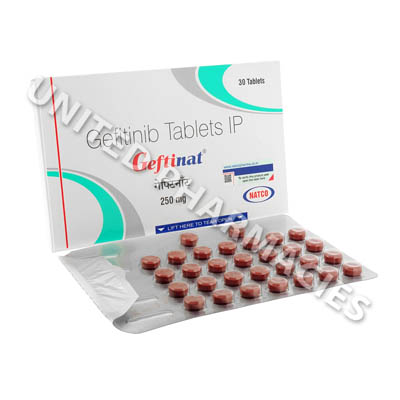Customers also like
CeeNU (Lomustine) - 10mg (20 Capsules)
from only £238.90
Erlocip-100 (Erlotinib) - 100mg (30 Tablets)
from only £174.92
Erlocip-150 (Erlotinib) - 150mg (30 Tablets)
from only £228.15
Imutrex (Methotrexate) - 2.5mg (10 Tablets)
from only £2.82
Capegard-500 (Capecitabine) - 500mg (10 Tablets)
from only £22.56
Imatib (Imatinib Mesylate) - 100mg (10 Tablets)
from only £19.36
Erlonat (Erlotinib) - 150mg (30 Tablets)
from only £323.60
Description
| Main Use | Active Ingredient | Marketed Name |
| Non-small cell lung cancer | Gefitinib | Geftinat |
Uses
Geftinat (Gefitinib) is used to treat non-small cell lung cancer. It works by inhibiting the action of epidermal growth factor tyrosine kinase (EGFR-TK) so as to stop the spread of cancer cells. In general, doctors recommend the use of this medicine in patients who have undergone unsuccessful treatment with other types of chemotherapy medications. When administered, this medicine directly targets the cancerous tumours.
In small-cell lung cancer, a type of protein known as EGF (epidermal growth factor) binds to the epidermal growth factor receptors on the cancer cells and causes the activation of the enzyme that is responsible for the regulation of signalling pathways (tyrosine kinase). This process allows the cancer cells to multiply. However, treatment with this medicine aims to prevent this by attaching to these EGF receptors and preventing their activation, thereby stopping the abnormal cancer cells from growing.
Dosage and Administration
Geftinat (Gefitinib) tablets are taken by mouth, together with a glass of water. You will be closely monitored for the duration of treatment by a doctor who specialises in anticancer treatment. Adult patients undergoing treatment for non-small cell lung cancer may be directed by their doctor to administer 250mg (equal to 1 tablet) per day. Doctors generally tell patients that the medicine may be taken alongside meals or without food. Never take more than the recommended dosage, and remember that if your doctor decides that the medicine is not being well tolerated by you, it is possible that treatment may be briefly interrupted or even discontinued. However, this will depend entirely on the opinion of the doctor in charge of treatment.
Side effects
Treatment with Geftinat (Gefitinib) could cause side effects, such as:
- Vomiting
- Weak feeling
- Sores in the mouth
- Reduction in appetite
- Acne and dry or cracked skin
Ensure that you disclose all side effects that occur to your doctor. You will require immediate medical attention if you suffer from serious side effects, including soreness affecting the eyes, problems related to eyesight, persistent sickness, bleeding from the nose, blood noticeable in the urine or any serious side effects which have not been listed in this paragraph.
Precautions
If you suffer from a cough, breathlessness or fever during treatment, see your doctor straight away, as these symptoms could be indicative of interstitial lung disease, a severe condition that may occur as a result of taking this medicine.
Women who are pregnant are not to take these tablets, due to the risk posed to the developing baby. Contraception should be used during treatment so as to prevent pregnancy, and women taking this medicine should also not breastfeed.
Seek immediate emergency medical attention if you suffer an allergic reaction. Symptoms to watch for, which may be indicative of a reaction, include skin rashes, hives, swelling of the face or limbs, trouble breathing, and trouble swallowing.
Always use Geftinat (Gefitinib) as you have been prescribed by your doctor. Never self-medicate or change your dosage without first consulting your doctor. The correct dosage can vary depending on your health, medical history, and the severity of the condition being treated.
This medication may not be safe for all patients. Before you begin using it always disclose the following to your doctor:
- If you are pregnant or breastfeeding.
- If you suffer from any allergies.
- If you suffer from any other health conditions or illnesses.
- If you are using any other medicine (including all non-prescription).
- If you are using any supplements, vitamins, or herbal products of any kind.



-Cap-10mg-UK-1s.jpg)
-Tab-100mg-UK-1s.jpg)
-Tab-150mg-UK-1s.jpg)
-Tab-2.5mg-UK-1s.jpg)
-Tab-500mg-UK-1s.jpg)
-Tab-100mg-UK-1s.jpg)
-Tab-150mg-UK-1s.jpg)




